Dry eye can be frustrating, especially when it affects your quality of life. What’s even more frustrating is not knowing why it’s happening. You may think screen time or the weather is causing your symptoms, but what if it’s your medications? Some medications can cause or worsen dry eye symptoms by affecting tear production or quality.
Some common types of medications known to cause dry eyes include:
- Antihistamines: Often used to treat allergies, antihistamines can reduce tear production, leading to dry eyes.
- Antidepressants: Some antidepressants can interfere with the nervous system’s ability to stimulate tear production.
- Blood pressure medications: Beta-blockers and diuretics, commonly used to manage hypertension, can decrease tear production and alter the composition of tears.
- Hormone replacement therapy: Hormonal changes can affect tear production, and some women on hormone replacement therapy may experience dry eyes.
- Isotretinoin (Accutane): Used to treat severe acne, this medication can significantly reduce tear production.
- Decongestants: Often found in cold and flu medications, decongestants can lead to reduced tear production and dry eyes.
Finding relief from medication-related dry eyes
If you think your medication might be causing your dry eyes, it’s important to talk with your healthcare provider before making any changes. They can help figure out if your medication is the issue and discuss other options if needed. In the meantime, here are some tips to help you find relief:
- Use artificial tears: Over-the-counter lubricating eye drops can help keep your eyes moist and relieve discomfort.
- Stay hydrated: Drinking plenty of water can support tear production and overall eye health.
- Take breaks from screens: To prevent eye strain, follow the 20-20-20 rule—every 20 minutes, look at something 20 feet away for at least 20 seconds.
- Use a humidifier: A humidifier adds more moisture to the air, which can be helpful in dry indoor environments.
- Wear sunglasses: Be sure to protect your eyes from the wind and sun by wearing sunglasses when you’re outside.
- Adjust your diet: Adding more omega-3 fatty acids to your diet may help with dry eyes. They are found in many foods, including fish and flaxseeds.
Visit Progressive Family Eye Care for treatment
If you’re still struggling with dry eye symptoms despite trying these tips, it might be time to explore our advanced dry eye treatment in Plymouth, Michigan. For more severe cases, we offer innovative solutions like BlephEx®, iLux®, and OptiLight IPL therapy. These treatments target the underlying causes of dry eye, rather than just alleviating the symptoms. Please contact us today or book an appointment online.





